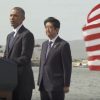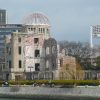12 Jun 2016
That is why we come to this place. We stand here, in the middle of this city, and force ourselves to imagine the moment the bomb fell. We force ourselves to feel the dread of children confused by what they see. We listen to a silent cry. We remember all the innocents killed across the arc of that terrible war, and the wars that came before, and the wars that would follow.
*dread n.恐怖
だからこそ、私たちはこの場所に来ました。この街の中心に立ち、爆弾が投下された瞬間を想像することを自らに課します。見るものに混乱した子どもたちの恐怖に思いを馳せることを自らに課します。声なき叫び声に耳を傾けます。私たちは、あの悲惨な戦争や、その前の戦争、またその後に起きた戦争で殺されたすべての罪なき人々を追悼します。
Mere words cannot give voice to such suffering, but we have a shared responsibility to look directly into the eye of history and ask what we must do differently to curb such suffering again. Someday the voices of the hibakusha will no longer be with us to bear witness. But the memory of the morning of August 6th, 1945 must never fade. That memory allows us to fight complacency. It fuels our moral imagination. It allows us to change.
*mere adj.単なる *give voice to 表す、口に出す *curb v.抑制する *bear witness v.証言する *fade v.徐々に消える *complacency n.自己満足
単なる言葉でこうした苦しみを表すことはできません。しかし私たちは歴史を直視し、そして、こうした苦しみを繰り返さないためには何をすべきかと問う共通の責任があります。いつの日か、証言する被爆者の声は私たちに届かなくなるでしょう。それでも1945年8月6日の朝の記憶を決して風化させてはなりません。その記憶があれば、私たちは独りよがりと戦えるのです。道徳的な想像力がかき立てられるのです。その記憶があれば、私たちは変われるのです。



